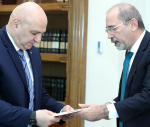You are here
Downing of a jet
Nov 11,2015 - Last updated at Nov 11,2015
The tragedy of the Russian airliner that crashed over the Sinai Peninsula last Saturday, 23 minutes after taking off from Sharm El Sheikh resort, killing all 224 people on board, is now the focus of a multinational investigation amid growing suspicion that it was the victim of a terrorist attack.
Egypt has rejected US and British claims that the sudden break-up of the plane at almost 9.1km was most likely caused by an explosion of a bomb on board.
Both President Barack Obama and Prime Minister David Cameron have supported such claims even as Egypt and Russia complained that vital Western intelligence has not been shared.
The Egyptian-led team of investigators will continue to inspect the crash site, with debris spread over an area 13 kilometres long, in search of clues.
But on Saturday, the team issued a statement pointing that analysis of the plane’s black boxes has revealed that the flight was normal until the 23rd minute, when both devices went silent.
The statement said that a noise was heard on the cabin recorder a moment before the Russian passenger jet plunged out of the skies. Determining the nature of this mysterious noise will take some time.
Jihadists in Sinai loyal to Daesh have already claimed responsibility for the downing of the plane, saying that it was a response to Russia’s recent military intervention in Syria.
As military analysts dismissed the possibility of a plane being hit at such high altitude by hand-held rockets that may be available to the militants, British intelligence came up with the theory that the bomb was most likely planted in the cargo bay of the plane at the Sharm El Sheikh airport.
A security breach of this sort, if proven, will have catastrophic results for Egypt.
Already Britain suspended charter flights to the Egyptian resort.
Few days after criticising the move, President Vladimir Putin halted Russian commercial jets from flying to Egypt and ordered the evacuation of over 70,000 Russian tourists who are already there.
Many international airliners decided to avoid flying over Sinai, while others refused to carry luggage that was cleared by Egyptian airports.
The repercussions for Egypt will be tremendous, both economically and politically.
President Abdel Fattah Al Sisi has been fighting Islamist jihadists in northern Sinai for more than a year now.
But in spite of launching one of the biggest military operations in Sinai since the 1973 Arab-Israel war, the Egyptian army is yet to deliver on its promise to defeat the militants.
If the Sinai rebels were actually behind the downing of the Russian jet, this would be one of the biggest operations Daesh has undertaken since it emerged on the scene more than three years ago.
The group’s ability to penetrate security at Sharm El Sheikh, which has been targeted by terrorists before, will undermine trust in Egypt’s security, intelligence and military institutions.
It will put Sisi under pressure both locally and internationally.
Of course, there is also the unlikely possibility that the Russian jet was shot, by mistake, by the Egyptian military itself.
Sinai is an active war zone and the Egyptian air force has been attacking militant targets in the northeast for many months.
Revelations that a British plane had a near miss with what the pilot believed was a missile, as it was landing in Sharm El Sheikh last August, raised additional concerns about aviation safety over the Sinai.
The Egyptians are right to wonder why their Western “friends” have failed to provide them with intelligence that would have helped reveal the truth about what happened to the doomed plane.
It would be disgraceful if these countries linked their cooperation with Egypt and Russia over the latter’s policies in Syria.
For Putin, the challenge is also daunting. If Islamist militants were indeed behind the downing of the Russian jet in retaliation for its military intervention in Syria, then he will have to face a public whiplash at home over his policies.
Moscow has sent missile systems to Syria to deal with the possibility that fighter jets could be hijacked in neighbouring countries and used to attack Russian forces.
The stakes for Russia will be higher from now on. Its war against terrorism will take a new course as a result.
This is more than what Putin has bargained for.
But then there is the bigger picture. A terror act that brought down a civilian plane is a first for Daesh and its affiliates. It widens the scope of the menace that this organisation poses to the region and to the world.
This is something that should draw attention to the chaos in Libya, where Daesh is in control of Sirte and other strategic areas, and to the fact that no country or coalition has managed to defeat this extremist group until now.
The political fallout from the Russian jet’s tragic end will be felt for many months to come.
The writer is a journalist and political commentator based in Amman.












